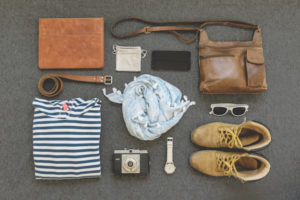 Much like the right belt or purse can make or break an outfit, the right accessories can elevate your hearing aid experience. There are a number of hearing accessories on the market and it is your Katy audiologist’s job to help you determine which ones will actually help you hear better.
Much like the right belt or purse can make or break an outfit, the right accessories can elevate your hearing aid experience. There are a number of hearing accessories on the market and it is your Katy audiologist’s job to help you determine which ones will actually help you hear better.
Assistive Listening Devices
Assistive listening devices (ALDs) are portable systems that help those with hearing loss communicate more effectively. Unlike hearing aids, which amplify sounds, ALDs work by separating speech from background noise. This allows the person with the hearing impairment to hear more clearly.
There are three types of ALDS
FM Systems
FM systems rely on radio signals to transmit amplified sounds directly to your hearing aid. They consist of a microphone, transmitter and receiver, and are used in a variety of public places such as classrooms, restaurants, movie theaters and churches.
The microphone is worn by the person speaking (or placed in close proximity to the sound source) and the signal is broadcast from the transmitter to the receiver, which is tuned to a specific frequency.
Infrared Systems
Infrared systems work on the same principle as FM systems, but use infrared light instead of radio waves to transmit sound. The transmitter converts sound signals into light and beams those to the receiver, which then translates the light signal back into sound.
An advantage to infrared systems is the fact that their signal is unable to pass through walls as it does with FM systems, eliminating competing broadcasts that might hamper the listener and preventing confidential information from being disseminated. They are particularly useful in courtrooms and large movie theaters.
Hearing Loops
Hearing loop, or induction loop, systems utilize electromagnetic energy to transmit sound directly to your hearing aid or cochlear implant. They consist of a sound source (public address systems are popular), an amplifier, a loop of wire and a receiver or telecoil (t-coil), a tiny wireless receiver built into many devices.
When you are in close proximity to the loop, you will receive clear sound free of background noise. Hearing loops can be connected to all types of audio sources, and are often set up in public facilities such as airports, churches and lecture halls.
Popular Hearing Aid Accessories
In addition to assistive listening devices, some of the more popular hearing aid accessories include:
-
Wireless accessories.
Utilizing Bluetooth® technology, wireless accessories enable you to hear better in situations where there is a lot of background noise or distance between you and the speaker. These include wireless microphones, remotes and television headsets.
-
Transmitters and receivers.
These are helpful in educational situations (a teacher’s words are transmitted directly into the student’s ears) and for children. Transmitters and receivers work together to overcome background noise, distance and reverberation, and contribute to a better learning experience.
-
Power adaptors and cords.
These add versatility by allowing direct input from various audio sources (FM systems, MP3 players, TVs and computers). Available with both monaural and binaural cords.
-
Earwax filters.
Filters prevent earwax, a leading cause of damage to electronic components, from entering the hearing aid. This helps prolong the life of the instrument and provides you with clear, natural sound.
-
Cleaning kits.
Keeping your hearing aids clean can result in a longer life for your instruments. Cleaning kits give you a leg up on keeping your device in prime working condition. They typically include a wax removal brush and pick, a tube and vent cleaner, battery door opener and battery replacement magnet.
-
Batteries.
It’s wise to have extra batteries on hand in case your current ones die in the middle of an important listening situation. They are especially helpful when you’re traveling.
As you can see, the number of accessories is rather overwhelming. Good thing you have a Katy audiologist on your side to help make some decisions. To learn more about which accessories will work for you, call Today’s Hearing at (281) 578-7500 today.